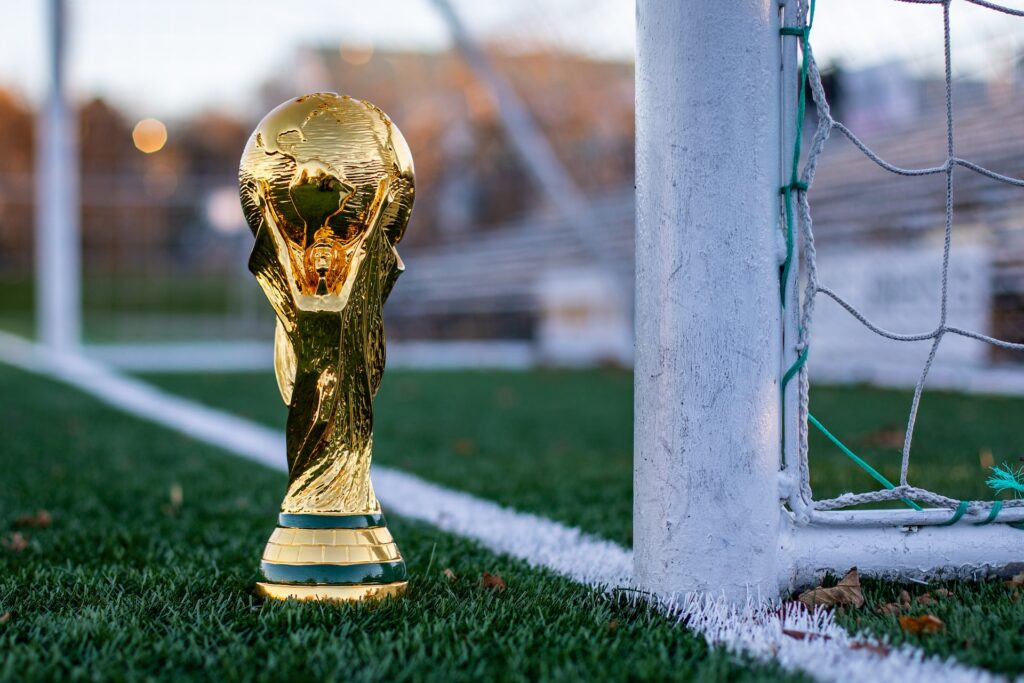Table of Contents
- Do teams get paid for winning the World Cup?
- World Cup prize money explained
- Individual team and player bonuses
- Do players get paid for playing for their national teams?
- Recap: Do teams get paid for winning the World Cup?
The prestige of playing in a World Cup alone must surely feel like the achievement of a lifetime; just imagine how it would feel to lift the famous trophy – but do teams get paid for winning the World Cup?!
You’ve grafted for years to perfect your game and have reached the pinnacle of soccer, winning the game’s ultimate prize. The satisfaction that must be felt to be among only a handful of legends who are now immortal in their sport is unattainable to the average person.
Yet soccer is a lucrative game with billions of dollars involved in hosting and organizing the world’s greatest spectacle.
With that in mind, do players get paid on top of that if they win the World Cup? If so, how much?
Do teams get paid for winning the World Cup?
Yes, national teams get paid for winning the World Cup. Winning the World Cup is lucrative to the successful team’s soccer association which can put the earnings towards further developing grassroots soccer or funding coaching programs.
FIFA, the international governing body for the sport, pays all participant nations depending on their performance throughout any single tournament.
The prize money varies each tournament, adjusted for factors like inflation. This year’s World Cup in Qatar will see the winners collect around $44 million.
A very nice amount, I’m sure you’ll agree. For comparison, the winnings from the 2018 World Cup in Russia, which saw France win the tournament, was $35 million.
Figures from the 1982 World Cup suggest that the winners received around $2.2 million at the tournament in Spain. The biggest jump between tournament editions was the $8 million that the victors won in 2002 compared to $20 million four years later.
There is a total pot of around $440 million for the national teams at this winter’s tournament, with those progressing further through the competition earning more prize money.
World Cup prize money explained
The further you make it through the tournament, the more your soccer association will collect. The figures presented are approximate but represent the percentages of the shared pot among competing sides for this year’s tournament.
If your team fails to make it out of the group stage, they will still bag approximately $9 million, which can go a long way for national teams who don’t always make it to World Cups.
Reaching the last 16 gets you $13 million, then the Quarter-Final earns you $17 million, finishing 4th generates $25 million, $27 million for 3rd place, and losing finalists earn $30 million.
The money doesn’t usually get sent directly from FIFA to the pockets of the players and coaches. Instead, it is sent to the nation’s governing soccer body who distributes the money between playing and coaching staff alike.
What the players do with that money, whether they keep it or donate it, is up to them. A lot of them decide to pass the proceeds onto a charitable cause.
This payment from FIFA is entirely different from the bonuses that players and coaches are paid by their respective soccer organization.
Individual team and player bonuses

Some teams will dish out different rewards than other soccer associations.
For instance, South Korea has decided to pay players $15,000 for appearing for the national team and are offering an extra $23,000 each for every win.
There’s $415,000 on offer for German players, on the other hand, if they win the tournament outright.
A lot of it depends on the expectation laid on the players by their soccer association. If your team is expected to win the tournament, you might be offered less as an incentive. However, if you’re underdogs, this cash incentive could drive you and your side on.
You also need to consider the resources at hand for a lot of soccer associations. For example, the English FA will have much more reserve capital than Costa Rica, for instance.
In 2006, Trinidad & Tobago stunned many by qualifying for the World Cup in Germany. The players were promised bonuses for qualifying and appearing at the tournament finals.
Bear in mind that some of these players were earning an objectively meagre amount (relative to soccer, obviously).
Years later and the Caribbean players were still waiting for this money; a shameful and unavoidable situation that took away so much of the joy the players must’ve felt during the tournament.
Do players get paid for playing for their national teams?
It’s true, soccer players get paid to appear for their national team, but not necessarily in a contracted sense.
We’ve previously discussed player earnings from international soccer on Soccer Knowledge Hub should you wish to know more about it in depth.
The fee they receive and the terms of their bonuses vary from nation to nation. Each appearance players make for their country earns them a match fee.
Let’s take the US men’s national team: every roster inclusion earns a player $5,000, with performance-based bonuses added onto this.
It’s common these days that players operating at the very top of the game will donate their national team earnings to charity. England men’s team has been giving 100% of their match fees to good causes for 15 years.
Kylian Mbappe once expressed his pleasure at just representing his country without being paid for it, knowing full well that his exorbitant salary from Paris Saint-Germain was more money than most people could even dream of.
Recap: Do teams get paid for winning the World Cup?
In summary, the World Cup winners do get paid by FIFA and the money goes to the country’s soccer association.
What players receive for winning the World Cup will depend on the agreement in place with their own soccer association, but whether the money is a motivator or simply pulling on the shirt to represent your homeland is what spurs individuals is probably different from person to person.
Now that you’re aware of the financial figures involved with winning the greatest prize in soccer, decide for yourself who’s most likely to take the trophy and cash prize home from Qatar this winter.

